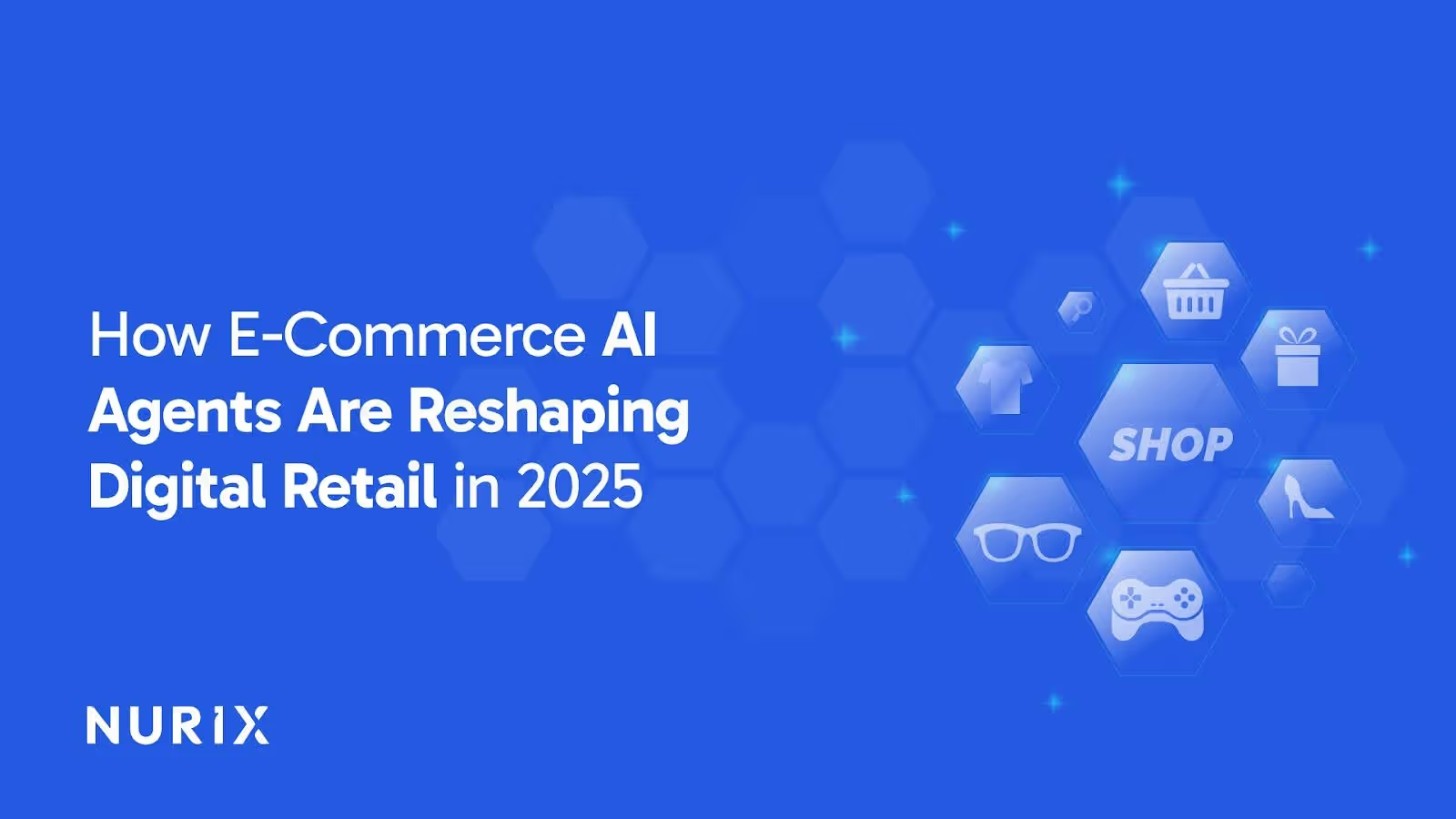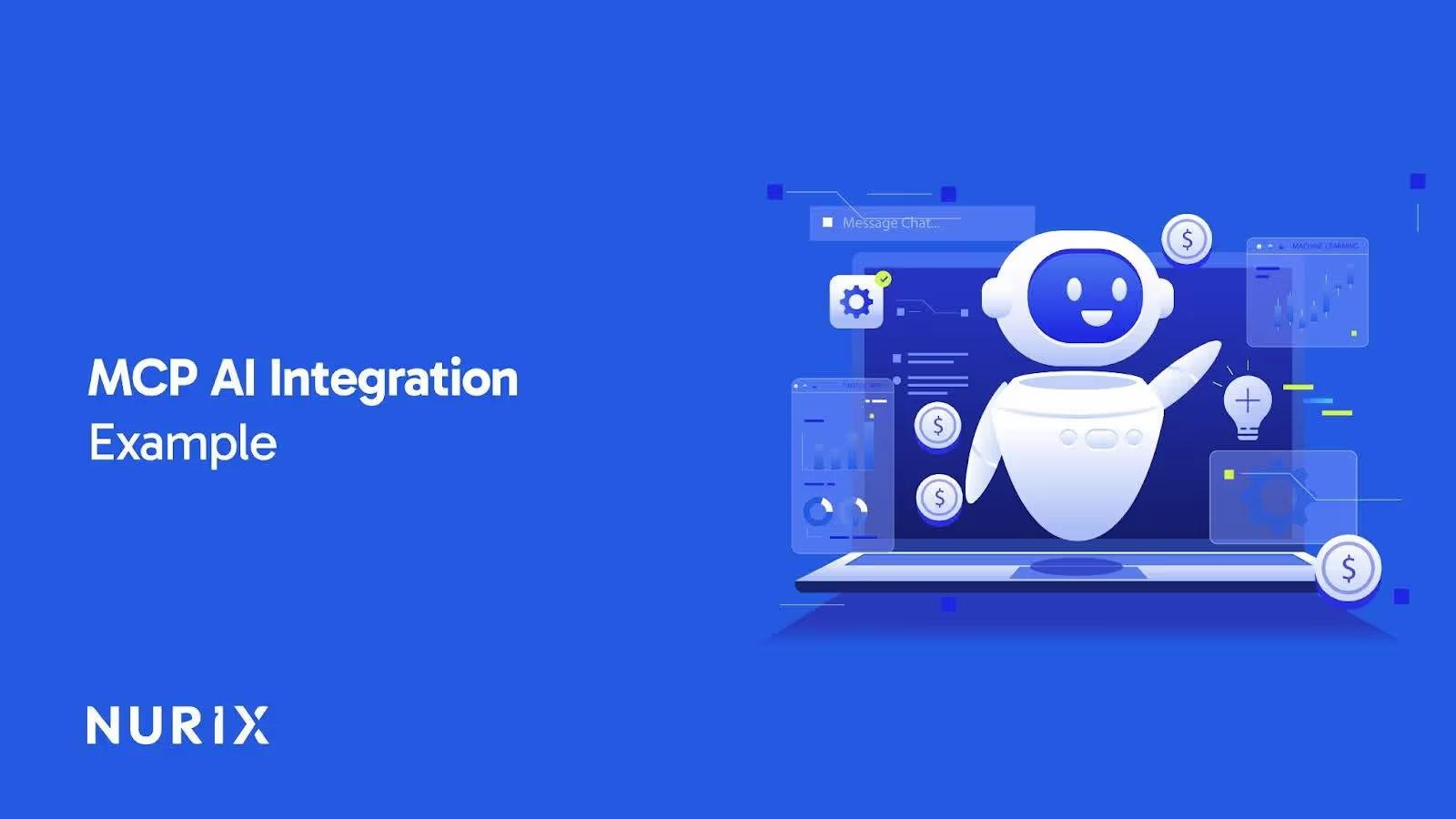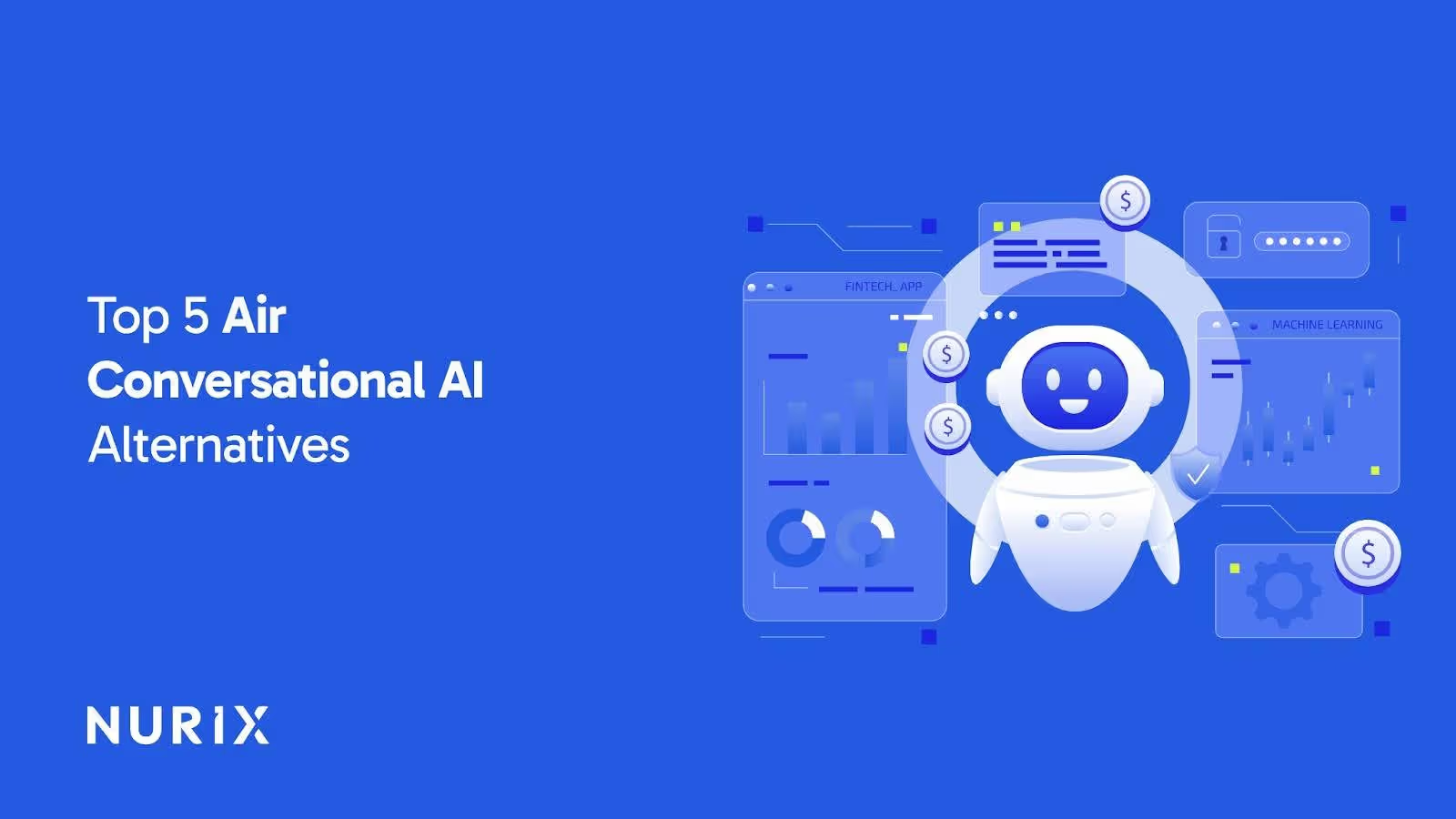How E-Commerce AI Agents Are Reshaping Digital Retail in 2025

In 2025, over 80% of consumer interactions in e-commerce are powered by AI agents. Yet, despite this massive shift, many businesses still fail to keep up with the demand for hyper-personalized experiences and lightning-fast support. The truth? Customers no longer tolerate delays or compromise on quality, and traditional support and sales methods are crumbling under pressure.
E-commerce AI agents are not just a solution; they're an inevitable evolution, capable of reshaping how we think about customer service, sales, and even brand loyalty. These agents don’t just react to requests; they predict, adapt, and engage in ways that humans simply can’t match. The question is: How long can businesses afford to operate without fully taking advantage of this new era of automation and intelligence?
In this guide, we'll dig deep into how AI agents are pushing the boundaries of e-commerce, solving problems that seemed impossible and creating new opportunities that most businesses have yet to realize.
What Are AI Agents in E-Commerce?
AI agents in e-commerce are advanced, autonomous systems that sense, interpret, and act upon their digital environment to achieve business and customer goals with minimal human involvement. Unlike traditional AI tools, which primarily analyze data or make recommendations, AI agents are proactive, goal-directed, and capable of orchestrating complex workflows independently.
These agents integrate several key components:
- Large Language Models (LLMs): Power the agent’s reasoning engine, allowing it to plan tasks, make decisions, and determine necessary actions.
- Memory Systems: Enable both short-term (contextual) and long-term (historical) memory, ensuring continuity across interactions and learning from past experiences.
- Planning and Execution: Break down tasks into actionable steps and adjust plans dynamically based on real-time feedback.
- Tool Integration: Connect with external systems via APIs and databases to fetch live data, automate operations, and improve decision-making.
In e-commerce, AI agents elevate customer journeys and business operations:
- Autonomous Navigation & Transaction Completion: Agents autonomously browse sites, compare products, and complete transactions, well beyond simple chatbots.
- Personalized Recommendations: By analyzing browsing and purchase data, agents deliver customized product suggestions, boosting conversion rates and average order value.
- Dynamic Pricing & Negotiation: Agents monitor competitor prices, adjust strategies, and negotiate deals to secure the best value for customers.
- Marketing Optimization: AI agents autonomously adjust campaign performance, audience targeting, and budgets to maximize ROI.
- Customer Experience Orchestration: Agents ensure smooth, personalized interactions across websites, mobile, social media, and physical stores.
- Operational Automation: From inventory management to customer support and cart abandonment follow-ups, agents automate repetitive tasks, freeing up human teams for strategic work.
The key differentiator is autonomy: these agents not only analyze and suggest but also act independently, adapting to new information and evolving customer needs without explicit instructions. This level of orchestration and self-direction sets agentic AI apart in the e-commerce landscape.
Once you grasp the role of AI agents in e-commerce, it’s crucial to understand the various types at play. Each has its own function and impact on the business, serving distinct purposes in improving both operations and customer engagement.
Types of AI Agents in E-Commerce
In e-commerce, AI agents are differentiated not just by their functional roles but by their underlying architectures and decision-making paradigms. Drawing from both academic and industry frameworks, here are the most advanced and operationally relevant types of AI agents deployed in e-commerce environments:
- Reactive Agents: These agents react to immediate inputs without memory or learning, often used for basic tasks like chatbots or order status updates. While efficient for transactional interactions, they cannot handle personalization or complex workflows.
- Model-Based Reflex Agents: These agents maintain context and state across interactions, enabling them to remember user preferences and session history. They're commonly used in customer support and recommendation systems, offering personalized responses based on user behavior.
- Goal-Based Agents: Designed to achieve specific objectives, such as increasing conversions or reducing cart abandonment, these agents plan actions using reinforcement learning. They are key to marketing automation, dynamic pricing, and retargeting strategies.
- Utility-Based Agents: Utility-based agents evaluate outcomes using utility functions, making decisions that balance competing objectives, like inventory costs versus lost sales. They’re critical for pricing optimization, inventory management, and logistics.
- Learning Agents: These agents improve by learning from data and feedback, using machine learning and predictive analytics. They drive personalization, fraud detection, and churn prediction, adapting their models as new data emerges.
- Autonomous (Self-Learning & Self-Healing) Agents: Operating independently, these agents adapt strategies and make decisions without human intervention, using reinforcement learning. They are used in warehouse automation, logistics, and complex customer service workflows.
- Multi-Agent Systems (MAS): MAS consist of multiple interacting agents that collaborate to solve tasks like supply chain management and fraud detection. These systems enable distributed decision-making and coordination, improving processes like fraud detection.
With a clear view of the various types of AI agents in e-commerce, it's important to look at the specific functions they perform. These capabilities are what allow these agents to make a tangible impact on both operational efficiency and customer experience.
Core Functions of E-Commerce AI Agents
E-commerce AI agents are redefining how businesses manage customer interactions, pricing, and workflows. Here’s a closer look at how these systems tackle the complexities of modern retail while addressing key operational pain points.
Autonomous Customer Interaction Management
- Real-Time Contextual Engagement: AI agents handle customer inquiries, process orders, manage returns, and resolve issues using natural language processing (NLP) and real-time data access, offering relevant responses across multiple channels (web, mobile, social, voice).
- Personalized Support: They adapt tone, recommendations, and strategies based on user behavior, sentiment, and historical interactions, ensuring a customized experience.
Intelligent Product Discovery and Recommendation
- Behavior-Driven Suggestions: Agents analyze browsing history and purchase patterns to provide hyper-personalized product recommendations, improving discoverability and conversion rates.
- Omnichannel Consistency: Product recommendations and cart contents are synchronized across all customer touchpoints for a smooth experience.
Dynamic Pricing and Negotiation
- Competitive Market Analysis: AI agents monitor competitor pricing and inventory, adjusting prices in real time to maximize sales and profitability.
- Automated Negotiation: Some advanced agents can negotiate deals with suppliers or other agents to secure optimal terms for both the retailer and the customer.
Marketing and Sales Automation
- Targeted Campaigns: Agents autonomously segment audiences, optimize ad placements, and personalize messages based on real-time data and predictive analytics.
- Cart Abandonment Recovery: They detect abandonment signals and trigger personalized incentives to recover lost sales and increase average order value.
Inventory and Supply Chain Optimization
- Demand Forecasting: AI agents predict inventory needs by analyzing sales trends, seasonality, and external signals to ensure optimal stock levels.
- Automated Replenishment: They initiate purchase orders and manage supplier relationships autonomously, streamlining supply chain operations.
Fraud Detection and Risk Management
- Anomaly Detection: Agents use machine learning models to identify suspicious transactions, fraudulent behavior, and security threats in real time.
- Continuous Learning: They evolve their algorithms to detect new fraud patterns, maintaining robust security.
Operational Efficiency and Workflow Automation
- Backend Integration: AI agents integrate with CRM, ERP, inventory, and order management systems, enabling smooth data flow and automated workflows.
- Self-Healing Systems: Advanced agents can detect operational anomalies (e.g., failed transactions) and initiate corrective actions without human intervention.
As AI agents take on more responsibilities in e-commerce, their core functions go far beyond simple tasks. Let’s look at how these capabilities are directly improving the overall customer experience.
How AI Agents Improve the Customer Experience
AI agents are reshaping how businesses engage with customers, but the real question is: Are they addressing the deeper needs of personalization and proactive support? Let’s break down how these agents are pushing the boundaries of customer experience.
Hyper-Personalization Through Behavioral Analytics
- Dynamic Profiling: AI agents analyze browsing history, purchase patterns, and contextual signals (e.g., device, location, time of day) to create dynamic customer profiles. This allows them to deliver customized recommendations, offers, and content, boosting engagement and conversion rates.
- Predictive Personalization: Using predictive analytics, agents anticipate customer needs before they are explicitly stated, suggesting complementary products, offering support, or adjusting content based on inferred intent.
Proactive and Contextual Support
- 24/7 Autonomous Assistance: AI agents provide instant support, autonomously resolving routine queries (order status, returns, refunds) and escalating complex issues to human agents as needed, ensuring timely assistance around the clock.
- Proactive Issue Resolution: By monitoring real-time data (e.g., delivery tracking, inventory status), agents can notify customers of potential issues (delays, out-of-stock items) and offer solutions before customers even notice.
Smooth Omnichannel Consistency
- Unified Experience Across Touchpoints: AI agents maintain context across channels (web, mobile, chat, voice), providing a consistent experience. For instance, a cart abandoned on mobile can be recovered via a personalized email or voice assistant.
- Voice and Conversational AI: Advanced voice agents enable natural, hands-free shopping and support, making the experience more accessible, especially for users on the go.
Intelligent Automation and Workflow Integration
- Automated Service Orchestration: AI agents automate workflows such as ticket creation, categorization, and routing, ensuring efficient handling of customer inquiries and reducing operational friction.
- Self-Healing Systems: When errors or anomalies occur (e.g., failed payments, system outages), agents can autonomously initiate corrective actions or reroute processes, minimizing disruptions.
Real-Time Data-Driven Decision Making
- Dynamic Pricing and Negotiation: Agents use real-time market data to adjust prices or negotiate deals, ensuring customers receive optimal value while retailers remain competitive.
- Continuous Learning and Adaptation: Through feedback loops and machine learning, agents continually refine their models and strategies, improving personalization and support over time.
As AI agents continue to redefine customer experiences, their deeper integration into e-commerce platforms is reshaping how businesses operate. Understanding the role of agentic AI is key to grasping the full extent of its impact on the future of e-commerce.
Understanding Agentic AI and Its Impact on E-Commerce
Agentic AI is redefining e-commerce by enabling autonomous, adaptive, and intelligent systems that handle complex, multi-step tasks with minimal human intervention.
Its impact spans hyper-personalization, supply chain optimization, autonomous marketing, and self-improving customer service, all underpinned by advanced architectures that support continuous learning, real-time adaptation, and scalable collaboration.
This positions agentic AI as a transformative force, driving efficiency, innovation, and competitive advantage in the digital marketplace.
While agentic AI introduces profound advancements in e-commerce, it also brings new challenges that must be carefully addressed. Let’s examine the key considerations and obstacles businesses face as they integrate these intelligent agents into their operations.
Challenges and Considerations of AI Agents in E-Commerce
While AI agents offer substantial benefits, they also bring forward complex challenges that must be addressed. Let’s examine the considerations businesses must keep in mind to fully realize their potential without compromising on security, transparency, or customer trust.
Requires clear AI strategy and careful resource allocation to ensure ROI and scalability.
As businesses face various challenges with AI agents, it’s clear that the future holds significant potential. Here’s a look at how these agents are poised to reshape e-commerce, moving beyond current limitations to drive the next phase of growth.
The Future of E-Commerce with AI Agents
As AI agents become more ingrained in e-commerce, their role will extend far beyond simple automation. Here’s a look at how they’re set to redefine business operations and customer experiences in the years to come.
- Mass Adoption: By 2026, 80% of organizations will operationalize AI designed for autonomy, with global AI spending projected to reach $300 billion by 2026.
- Customer Service Revolution: By 2029, AI agents are expected to autonomously resolve 80% of common customer service issues, driving higher satisfaction and efficiency.
- Multi-Agent Systems (MAS): The rise of MAS will enable complex, collaborative workflows, reducing operational friction and accelerating business outcomes.
How Nurix AI Can Help?
Nurix AI Agent is an enterprise-grade, customizable AI platform designed to transform digital commerce and customer engagement through intelligent automation and hyper-personalized interactions.
Built for organizations seeking to future-proof their operations, Nurix AI Agent smoothly integrates with existing workflows and delivers scalable, context-aware solutions for sales, support, and backend efficiency, all while maintaining a human touch.
Key Features of Nurix AI Agent
- Multimodal, Human-Like Interactions: Supports both voice and chat, enabling natural, conversational experiences that mirror human engagement across all customer touchpoints.
- 24/7 Autonomous Support: Delivers instant, round-the-clock customer service, resolving queries, processing orders, and managing refunds with minimal latency.
- Omnichannel and Contextual Awareness: Maintains smooth, personalized experiences across web, mobile, social, and voice channels, ensuring consistency and continuity for every user.
- Advanced Personalization: Uses behavioral data, sentiment analysis, and predictive analytics to customize recommendations, offers, and support to individual customer needs.
- Smooth Integration: Easily connects with CRM, ERP, and third-party platforms, enabling end-to-end automation without infrastructure overhaul.
- Agentic Workflows and Autonomous Task Execution: Empowers agents to plan, execute, and adapt complex workflows autonomously, from order management to supply chain optimization.
- Continuous Learning and Improvement: Evolves through feedback loops and real-time data, refining strategies and performance over time for sustained business impact.
- Enterprise-Grade Security and Compliance: Built-in data integrity, advanced security protocols, and compliance tracking ensure safe, reliable operations for regulated industries.
- Custom Solutions for Every Business: Offers customized deployments for startups, SMBs, and large enterprises, with rapid onboarding and scalable support.
Conclusion
As AI agents continue to evolve, they are quickly becoming a central part of e-commerce operations. Businesses that integrate these intelligent systems are finding new ways to improve customer experiences and streamline operations. The shift towards automation and personalization is undeniable, and those who don’t adapt will risk falling behind.
The question is no longer whether AI will shape the future, but how your business will respond to the changes already underway. The future is here. Are you ready for it?
For businesses looking to step into the future of e-commerce, Nurix AI offers a customizable platform that streamlines operations and optimizes customer experiences.
With its advanced capabilities, Nurix AI enables you to stay competitive and meet the demands of a rapidly changing market. Discover how Nurix AI can redefine your approach to digital commerce. Get in touch with us!
FAQs About AI Agents in E-Commerce
- How do AI agents handle dynamic or JavaScript-heavy product pages that lack structured data?
AI agents often struggle with pages where critical information, like pricing or availability, is rendered dynamically via JavaScript and not available in structured markup. This can limit their ability to accurately compare products or complete transactions, unless the site provides machine-readable APIs or schema markup.
- What happens when an AI agent is mistakenly flagged as a bot by fraud detection systems?
Many e-commerce fraud systems are designed to block bots, but they may also block legitimate AI agents, halting transactions. Enterprises must adapt their security protocols (such as using API keys or OAuth for agent authentication) to distinguish between malicious bots and authorized AI agents.
- Can AI agents autonomously negotiate with suppliers or other agents for better deals?
Advanced AI agents are now being developed to autonomously negotiate terms, such as pricing or delivery schedules, with suppliers or other agents, using real-time data and predefined business rules to secure optimal outcomes. This is an emerging capability, especially in supply chain and procurement automation.
- How do AI agents ensure that the personalization they provide does not become intrusive or violate privacy?
AI agents must balance hyper-personalization with privacy by implementing robust data minimization, anonymization, and consent management strategies. Enterprises must also monitor for over-personalization, which can erode customer trust if perceived as intrusive.
- What measures are in place to audit and correct biases in AI agent decision-making?
To address the risk of bias, organizations implement regular audits of AI agent decisions, employ diverse and representative training data, and establish clear accountability frameworks. This is crucial for maintaining fairness and trust, especially in customer service and pricing decisions.









